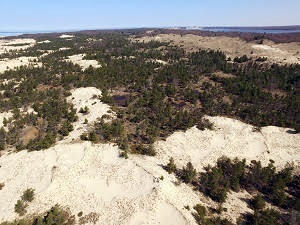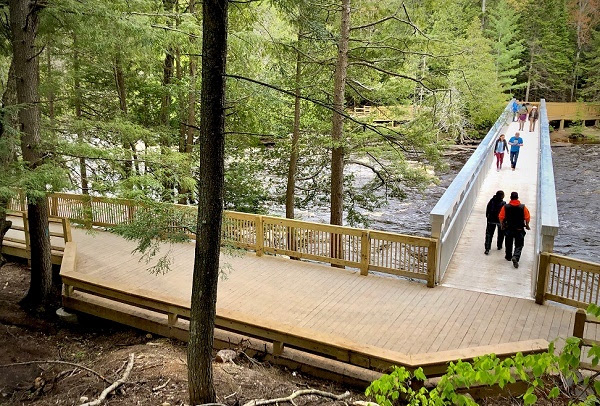Pristine sand dunes part of 100-acre addition to Ludington State Park

Contact: Ron Olson (DNR), 517-243-1477
Purchase to be funded by state sources, commitments from The Nature Conservancy and the Mott Foundation
The 100 acres, adjacent to Ludington State Park, are comprised of sand dunes – about 60 acres of which have never been altered. The property is located in the northern section of a larger 372 acres that have been mined for sand for decades. Although surrounded by state park land on three sides, the Sargent property is not yet part of Ludington State Park, where mining does not occur.
“This purchase will permanently protect a beautiful tract of critical sand dunes, conserving a unique landform and its plants and animals for public enjoyment,” said DNR Director Keith Creagh, who approved the purchase during the Oct. 11 Natural Resources Commission meeting in Lansing. “We are very appreciative of the willingness of the Sargent family to work with the DNR on this purchase. Their generous actions will leave a considerable legacy for future generations.”
While active mining continues in the holding, much of the remaining land already has been mined and reclaimed by the company. The mining operation is operated on-site under a permit issued by the Michigan Department of Environmental Quality. The reclamation of mined lands is a requirement of the permit, which expires Dec. 31, 2021, and can be renewed.
The $17 million acquisition of the 100-acre parcel will be funded by the Michigan Natural Resources Trust Fund, the Michigan State Park Endowment Fund, the Land Exchange Facilitation Fund – sources managed by the DNR or by an independent board associated with the department – and by commitments of $1 million each from The Nature Conservancy and the Charles Stewart Mott Foundation.
 “The Nature Conservancy is thrilled to help protect this beautiful property as part of Ludington State Park for all of Michigan’s residents and visitors to enjoy,” said Helen Taylor, the conservancy’s state director for Michigan. “The Nature Conservancy is thrilled to help protect this beautiful property as part of Ludington State Park for all of Michigan’s residents and visitors to enjoy,” said Helen Taylor, the conservancy’s state director for Michigan.
“The Mott Foundation sees this as a unique opportunity to protect land that is truly the front door of Ludington State Park,” said Ridgway White, president and CEO of the foundation. The Sargent family previously donated land to the DNR, including a portion of property at the entrance to the park. Discussions continue with the Sargent family about opportunities for the DNR to acquire additional property adjacent to the park. The Sargent land contains sand resources, an on-site processing plant and two lakes created by the mining operations. The DNR has retained $1.3 million in Michigan Natural Resources Trust Fund grants as part of the cost for a potential future acquisition. Other sources, including private donations, also are being sought. Joe Engel, executive director of the Land Conservancy of West Michigan, said the land acquisition is a tremendous gift to the Ludington community and its economic future, and a fitting tribute to the efforts of the Sargent family and the DNR. “We look forward to working with the folks in Ludington, as well as others across the region and state, to secure and preserve the remainder of this amazing, Lake Michigan treasure,” Engel said. |
 “Ludington is one of the crown jewels of our state parks system. For millions of people who love the Lake Michigan dune coast, it is the epitome of Pure Michigan,” said Glen Chown, executive director of the Grand Traverse Regional Land Conservancy. “We’re proud to partner with the DNR, other land trusts and the local community on this important opportunity.” “Ludington is one of the crown jewels of our state parks system. For millions of people who love the Lake Michigan dune coast, it is the epitome of Pure Michigan,” said Glen Chown, executive director of the Grand Traverse Regional Land Conservancy. “We’re proud to partner with the DNR, other land trusts and the local community on this important opportunity.”
Chown noted that local support is crucial to leveraging a significant amount of public dollars. “We are confident that people with a deep affinity for this amazing park will generously respond to the challenge,” he said. “We are thankful for the Sargent family’s willingness to work with all of us on this important shoreline protection opportunity.” Ludington State Park is located north of the city of Ludington between the shores of Lake Michigan and Hamlin Lake. The park comprises nearly 5,300 acres and contains forests, sand dunes and beachfront access to Lake Michigan. More than 1 million people visit the park every year. According to Ron Olson, DNR Parks and Recreation Division chief, the department will establish a public planning process to determine how present and future recreational use of the newly acquired 100 acres fits into Ludington State Park’s overall management plan. Olson said that public input, at every stage, is an important part of the DNR’s statewide park management planning process. |





